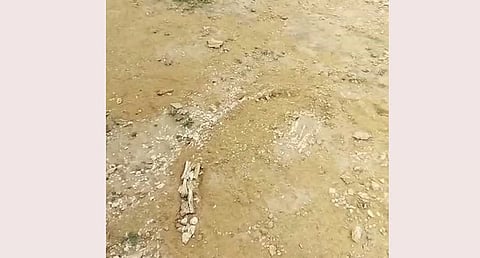

Written by Rajesh Asnani for The New Indian Express
Suspense and excitement continue to mount in Megha village in Fatehgarh subdivision of Jaisalmer district where ancient fossilised remains were recently unearthed near Harpal’s pond. During excavation, researchers found fossilised stones resembling wood along with a large vertebrate bone structure which has sparked intense speculation of a prehistoric creature dating back millions of years.
While Jaisalmer has yielded several important paleontological finds in the past, this latest discovery is being viewed as particularly significant. Initial assessments suggest the fossil belongs to a prehistoric reptile, with experts linking the find to the Late Triassic and Jurassic formations of the region.
While these remains were discovered by locals in end-August, a team of scientists from the JNV University in Jodhpur has collected the relevant samples. Local authorities have ensured that the entire area has been well-protected through barbed wires.
Fatehgarh SDM Bharat Gurjar confirmed that the remains discovered a few weeks ago have now been fully secured. “We have preserved the fossil and enclosed the site. A team from Jodhpur’s JNV University has already collected samples, and we have written to the Geological Survey of India (GSI). Only after GSI’s study will the age and classification of the fossil be officially confirmed,” he said.
Senior groundwater scientist Dr. Narayandas Inkhia noted that Jaisalmer has a long record of fossil discoveries, including confirmed dinosaur remains in Akal and Thaiyat. “At first glance, this vertebrate structure appears to be 6-7 feet long. While it would be premature to label it a dinosaur, it may indeed belong to a large prehistoric reptile.
Fossil vertebrates dating back nearly 180 million years have been found here before,” he said. Dr Inkhiya and his team who work for the state’s water department had played a vital role in unearthing the discovery at Megha village in Jaisalmer.
In addition, researcher Parth Jagani, who examined the fossil, observed that its spine is clearly visible. “The fossil is six to seven feet long and three to four feet wide. Its size indicates it was a large semiaquatic creature.
Given the Jurassic-age rock formations of the region, the fossil likely belongs to that era. Earlier, dinosaur footprints, shark fossils, and marine remains have been recorded in Jaisalmer. This too may represent a major addition to that record,” he explained.
Experts believe that the site could hold “many more hidden fossils” that may provide crucial on the history of evolution.
